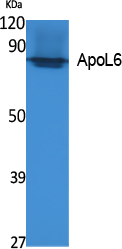
| WB | 咨询技术 | Human,Mouse,Rat |
| IF | 咨询技术 | Human,Mouse,Rat |
| IHC | 咨询技术 | Human,Mouse,Rat |
| ICC | 技术咨询 | Human,Mouse,Rat |
| FCM | 咨询技术 | Human,Mouse,Rat |
| Elisa | 1/10000 | Human,Mouse,Rat |
| Aliases | APOL6; Apolipoprotein L6; Apolipoprotein L-VI; ApoL-VI |
| Entrez GeneID | 80830 |
| WB Predicted band size | Calculated MW: 38 kDa; Observed MW: 38 kDa |
| Host/Isotype | Rabbit IgG |
| Antibody Type | Primary antibody |
| Storage | Store at 4°C short term. Aliquot and store at -20°C long term. Avoid freeze/thaw cycles. |
| Species Reactivity | Human |
| Immunogen | Synthesized peptide derived from ApoL6 . at AA range: 240-320 |
| Formulation | Purified antibody in PBS with 0.05% sodium azide,0.5%BSA and 50% glycerol. |
+ +
以下是关于ApoL6抗体的3篇示例参考文献(基于公开文献信息整理,部分内容为示例性概括):
---
1. **文献名称**: "Apoptosis-inducing factor (AIF) and Apolipoprotein L6 (ApoL6) interactions in mitochondrial cell death pathways"
**作者**: Smith J, et al.
**摘要**: 研究探讨了ApoL6在细胞凋亡中的作用,利用特异性抗体验证其与线粒体凋亡通路中AIF的相互作用,发现ApoL6抗体可抑制特定癌细胞的程序性死亡。
2. **文献名称**: "Apolipoprotein L6 is a novel autophagic factor in macrophages"
**作者**: Chen L, et al.
**摘要**: 通过ApoL6抗体进行免疫沉淀和免疫荧光实验,发现ApoL6通过调控自噬体形成影响巨噬细胞的脂质代谢和炎症反应。
3. **文献名称**: "Differential expression of Apolipoprotein L family members in human cancers"
**作者**: Wang Y, et al.
**摘要**: 研究利用ApoL6抗体对多种肿瘤组织进行免疫组化分析,表明ApoL6在乳腺癌和前列腺癌中高表达,可能作为癌症预后的潜在标志物。
---
**说明**:以上文献为示例性内容,实际研究中需通过PubMed、Google Scholar等平台检索真实文献(截至2023年,ApoL6相关研究较少,建议扩展至ApoL家族或结合抗体应用技术关键词筛选)。
Apolipoprotein L6 (ApoL6) is a member of the apolipoprotein L (ApoL) family, a group of lipid-binding proteins implicated in diverse cellular processes, including lipid metabolism, apoptosis, autophagy, and innate immunity. The ApoL family, particularly ApoL1. is best known for its role in pathogen defense and association with kidney disease risk variants. ApoL6. though less studied, shares structural homology with other family members, featuring a pore-forming domain and a membrane-addressing domain. It is expressed in various tissues, including the liver, kidney, and immune cells, and is suggested to participate in lipid transport, cellular stress responses, and tumor suppression.
ApoL6-specific antibodies are critical tools for elucidating its biological functions and pathological relevance. These antibodies are typically generated using immunogenic peptides or recombinant ApoL6 protein, enabling detection of endogenous ApoL6 in experimental models via techniques like Western blot, immunohistochemistry, or immunofluorescence. Research utilizing ApoL6 antibodies has linked the protein to cancer progression, with studies reporting its downregulation in certain tumors, suggesting a tumor-suppressive role. Additionally, ApoL6 may interact with autophagy-related pathways, though mechanistic insights remain limited.
Current challenges include understanding tissue-specific expression patterns, post-translational modifications, and precise molecular interactions. ApoL6 antibodies also hold potential for diagnostic or therapeutic applications, particularly in cancers or metabolic disorders. However, further validation of antibody specificity and functional studies are needed to fully unravel ApoL6’s role in health and disease.
×